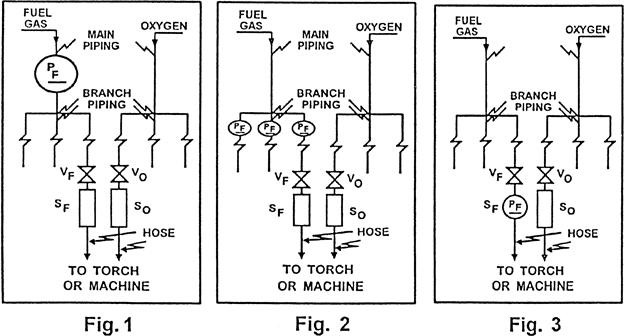PDFWAC 296-307-48047
Piping protective equipment.
(1) The fuel-gas and oxygen piping systems, including portable outlet headers must incorporate the protective equipment shown in Figures V-1, V-2, and V-3.
When only a portion of a fuel-gas system is to be used with oxygen, only that portion must meet this requirement.
(2) Approved protective equipment (designated PF in Figs. V-1, V-2, and V-3) must be installed in fuel-gas piping to prevent:
(a) Backflow of oxygen into the fuel-gas supply system;
(b) Passage of a flash back into the fuel-gas supply system; and
(c) Excessive back pressure of oxygen in the fuel-gas supply system. The three functions of the protective equipment may be combined in one device or may be provided by separate devices.
 |
PF = Protective equipment in fuel-gas piping
VF = Fuel-gas station outlet valve
VO = Oxygen station outlet valve
SF = Backflow prevention device(s) at fuel-gas station outlet
SO = Backflow prevention device(s) at oxygen station outlet
(3) The protective equipment must be located in the main supply line, as in Figure 1 or at the head of each branch line, as in Figure 2 or at each location where fuel-gas is withdrawn, as in Figure 3. Where branch lines are of 2-inch pipe size or larger or of substantial length, protective equipment (designated as PF) must be located as shown in either 2 or 3.
(4) Backflow protection must be provided by an approved device that will prevent oxygen from flowing into the fuel-gas system or fuel from flowing into the oxygen system (see SF, Figs. 1 and 2).
(5) Flash-back protection must be provided by an approved device that will prevent flame from passing into the fuel-gas system.
(6) Back-pressure protection must be provided by an approved pressure-relief device set at a pressure not greater than the pressure rating of the backflow or the flashback protection device, whichever is lower. The pressure-relief device must be located on the downstream side of the backflow and flashback protection devices. The vent from the pressure-relief device must be at least as large as the relief device inlet and must be installed without low points that may collect moisture. If low points are unavoidable, drip pots with drains closed with screw plugs or caps must be installed at the low points. The vent terminus must not endanger personnel or property through gas discharge; must be located away from ignition sources; and must terminate in a hood or bend.
(7) If pipeline protective equipment incorporates a liquid, the liquid level must be maintained, and a suitable antifreeze may be used to prevent freezing.
(8) Fuel-gas for use with equipment not requiring oxygen must be withdrawn upstream of the piping protective devices.
[Statutory Authority: RCW 49.17.010, 49.17.040, 49.17.050, and 49.17.060. WSR 20-21-091, § 296-307-48047, filed 10/20/20, effective 11/20/20. WSR 97-09-013, recodified as § 296-307-48047, filed 4/7/97, effective 4/7/97. Statutory Authority: RCW 49.17.040, [49.17.]050 and [49.17.]060. WSR 96-22-048, § 296-306A-48047, filed 10/31/96, effective 12/1/96.]